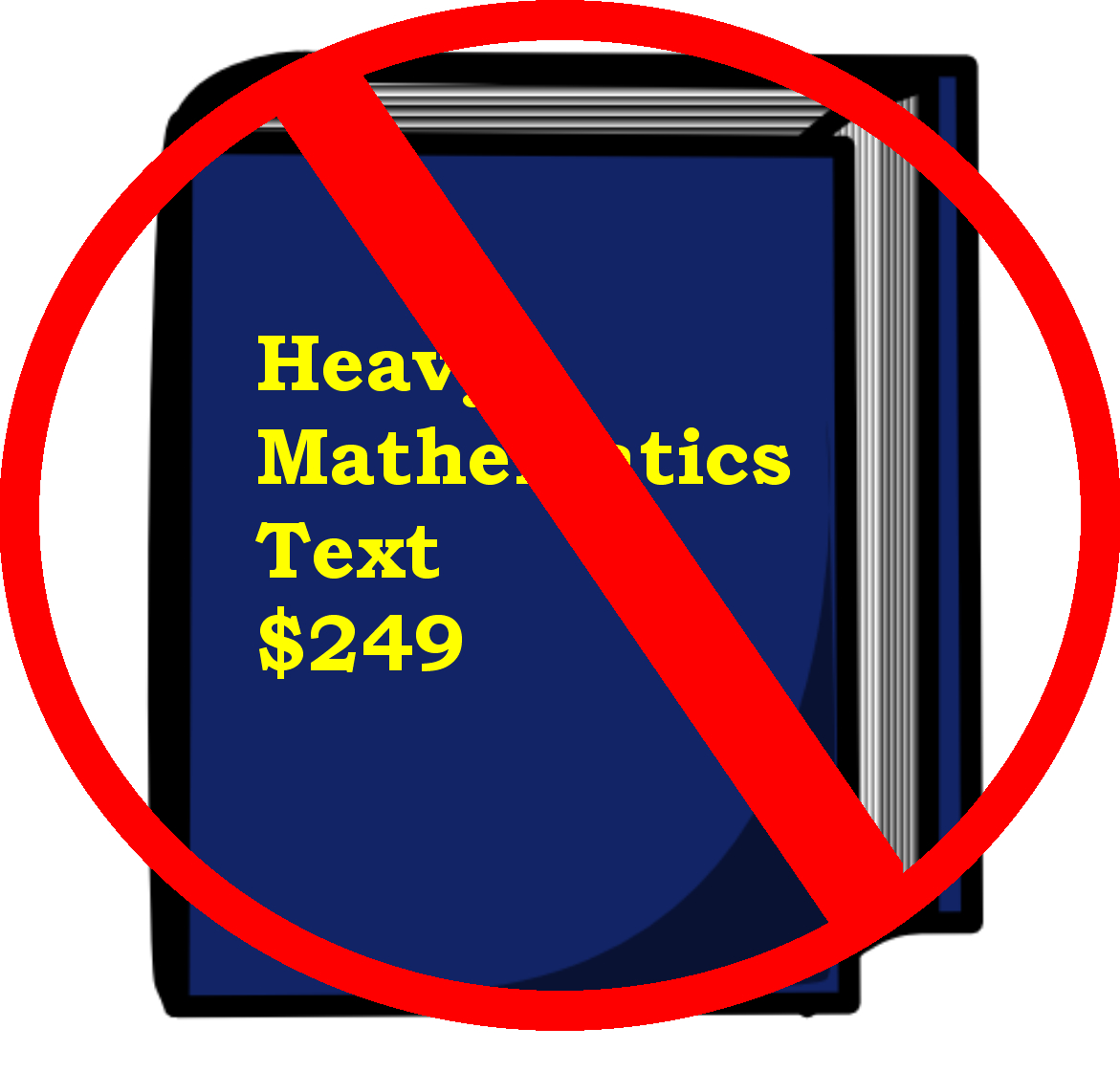What I wish, in relation to textbooks (first, get rid of the publishers)
Posted by: Gary Ernest Davis on: February 13, 2011
I have just been watching, for the 4th or 5th time, the Bloomberg Channel’s Game Changers story of Steve Jobs.
The thing that got me thinking again about the very high price of student text books was Steve’s implementation of i-Tunes: 99¢ a tune, or forget it.
Steve Jobs and Apple had both the hardware – the iPod – and the software – iTunes – to pull this off.
Here’s what I wish for student textbooks (and I am talking particularly mathematics texts, which I know most about, but the same seems to apply to all fields of study):
1. Textbooks are free to students, or very inexpensive: maybe 99¢ a chapter.
This would, for example, bring Stewart’s Calculus, a book of 18 chapters with a list price of $224.95 , down to $17.82.
And because Calculus I students do not need the entire book in the first semester of calculus, they would pay only something like $6 for the first semester. If they continued to Calculus 2 and 3 they would pay another $6 in each of the following two semesters.
2. Textbooks have ads targeted at, and useful to, the students who are using the texts.
On what sort of things are school kids and college kids going to spend their money?
Uhm, let’s see: phones, clothes, music, computers, video players, CDs, DVDs, calculators, ….
If you’re over 25 years old you will probably see this as grubby commercialism. The 18-22 year-olds I have surveyed – informally – think this idea is GREAT: “Are you kidding?” they ask. “A really cheap textbook that gives us ads for things we want? That’s great!”
So get over it: kids will happily accept ads, especially for things they are interested in, over having to pay more than $200 × 4 = $800 each semester on books they don’t read, or – worse – not buying the books at all because they are too expensive.
3. Textbooks are e-books, readable on iPads and Kindle.
 There’s a couple of reasons for this.
There’s a couple of reasons for this.
First, one small, lightweight, device, can hold all those heavy textbooks.
Sure an iPad might cost $420. But that’s less than what students, or their parents, are expected to pay for just 2 paper textbooks.
Oh, yeah, and with an iPad you can surf the Web and send and receive email, and here’s all them there app thingies, where you can check stuff and order pizza.
It’s not rocket science folks.
Second, on an iPad – and maybe even a Kindle – we can have Google Ads, or Amazon ads. or ….? 
These are ads targeted to the readers and the subject matter.
4. The content authors – the dudes who write the content – get paid from the advertisers.
The more popular and useful their content, the more dollars they pull in from the advertisers.
Just like what happens now, except that the publishers, distributors, booksellers, and printers are not making fistfuls of dollars from the sales of texts.
Maybe there’s some snappy designers in the mix who make a buck.
5. The winners have to be students, and their parents (= bankrollers).
They will pay much less for the same high quality product – maybe even better quality because nothing would stop content providers – the authors – and their design partners – inserting videos directly into e-texts.
6. I want to know how we can make this happen.
We can begin with one content area (I would start with mathematics, surprise!)
We need some authors, willing to take a chance; some designers willing to do the same; some technical guys to get the content onto the devices; and some marketing people who know about Google Ads, Amazon ads, and other e-based advertising.
Then we need to target a particular market – say calculus – and figure out how to get students and their parents, to INSIST that their teachers adopt these sexy, cheaper e-texts.
If Egyptian people can get rid of a dictator, students can reform recalcitrant professors and teachers.
How can we do this?
Who’s willing to give it a shot?
10 Responses to "What I wish, in relation to textbooks (first, get rid of the publishers)"
[…] This post was mentioned on Twitter by Dana C. Ernst, Republic of Math. Republic of Math said: What I wish, in relation to #textbooks (first, get rid of the publishers). Vote now! http://wp.me/pJESd-19z […]
Well ! Cheap text books are good, iff you’re going for blind knowledge. And if you are reading a text book with Adverts, it may harm your concentration on the subject. [I like Open Sources, because these are global and easily available all across the world, whether US or India or Africa.] By the way thanks for the info.
Sorry for linguistic mistakes if made.
Gaurav,
how do you figure cheap texts equate to blind knowledge?
What about, for example, Ordinary Differential Equations by Morris Tenenbaum & Harry Pollard. ISBN 978-0486649405. It gets outstanding reviews on amazon.com, and is a pretty good book , with a great deal of information for only $25 (less used).
At a high school level, this has already happened:
http://www.fhsst.org/node/8097
Gr10 – 12 Physical Science and Mathematics are available, in second edition, maintained actively, have memos being developed by the community, and are loved by the kids who use them (I am their teacher). See http://cnx.org/lenses/fhsst for the online customisable version. Other subjects are also happening.
The Shuttleworth foundation (As in ubuntu linux) seeded this project. Nothing stopping the generation of undergrad texts in an appropriate http://cnx.org/ “lens”. Find someone who has written their own notes for a course, and start there.
To answer the question “Who’s going to make it happen” – someone who cares enough to try. My thanks to the University of Cape Town science faculty for caring about South African school science enough to make it happen!
Grant Hillebrand
The idea doesn’t make sense to me. If Stewart’s textbook sells for $225, it is because the market is willing to pay $225. Putting advertisements in the books wouldn’t change that very much. It would sell for $200 and include advertisements.
The real cause is a principal-agent problem. Textbooks are selected by faculty members, who are relatively insensitive to price, not by students. If the students could choose the textbook then the publishers would have to compete on price.
Dave,
your second paragraph undermines the argument that this is a free market.
The idea of the ads is to allow the advertisers, not the students, to pay for the production costs , which, the argument goes, they will do because they expect the revenue – which students spend anyway (more so since they are not spending large amounts on books).
Just found your blog today.
I think some people are getting started on making open source texts. You might want to check this out.
http://www.lightandmatter.com/
There is the beginning of a calc text on there. You can either download a free PDF or purchase a hardcover book.
Looking forward to reading more!


February 13, 2011 at 6:03 pm
Have you considered the privacy implications of allowing advertisements which would collect information on students?
I think that this is the wrong direction. I don’t want cheap textbooks. I want free open source textbooks, and I think it will happen in the near future.
February 13, 2011 at 6:06 pm
Dave,
the students I’ve asked – admittedly not a scientific study – think it’s a great idea. These are students who give away details on Facebook. Maybe they will one day regret that.
Open source would be great – I agree – but who’s going to make it happen?